Two brands often dominate the conversation about luxury automobiles: Mercedes-Benz and BMW. Both brands boast rich histories, a reputation for quality, and a loyal fan base.
However, they cater to slightly different preferences and driving experiences. The rivalry between Mercedes-Benz and BMW is fierce. Both brands are celebrated for their innovative engineering, advanced technology, and luxurious designs. But which one truly stands out?
In this comprehensive comparison, we’ll evaluate aspects such as performance, maintenance, and overall experience to determine whether Mercedes-Benz or BMW is the better brand.
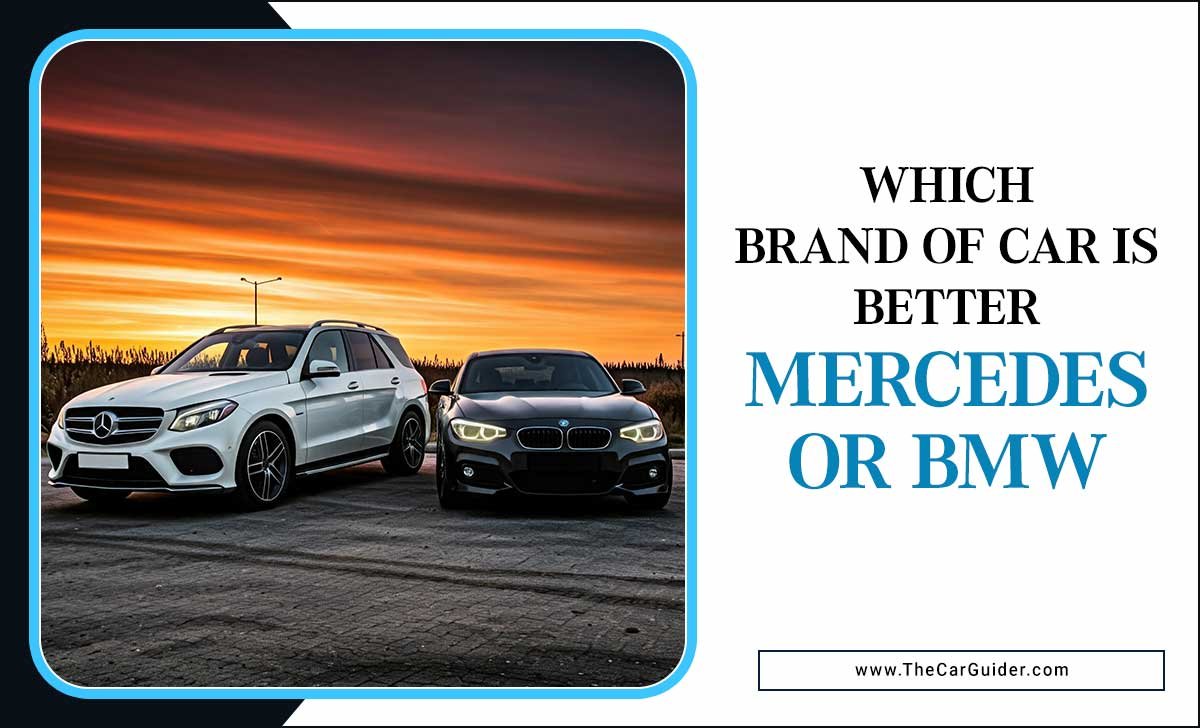
Key Takeaways:
- Mercedes-Benz excels in luxury, comfort, and smooth driving experiences, making it ideal for those prioritizing elegance and relaxation.
- BMW focuses on performance, sporty handling, and driver engagement, appealing to enthusiasts seeking a dynamic drive.
- Both brands offer cutting-edge technology, but Mercedes’ MBUX is known for voice recognition, while BMW’s iDrive is user-friendly.
- Reliability and maintenance costs are comparable, though BMW has a slight edge in resale value.
- Pricing: BMW often has more budget-friendly options, while Mercedes caters to high-end luxury buyers.
- Ultimately, your choice depends on personal preference: comfort (Mercedes) vs. performance (BMW).
Overview Of The Brands: A Comparison Between Mercedes And BMW
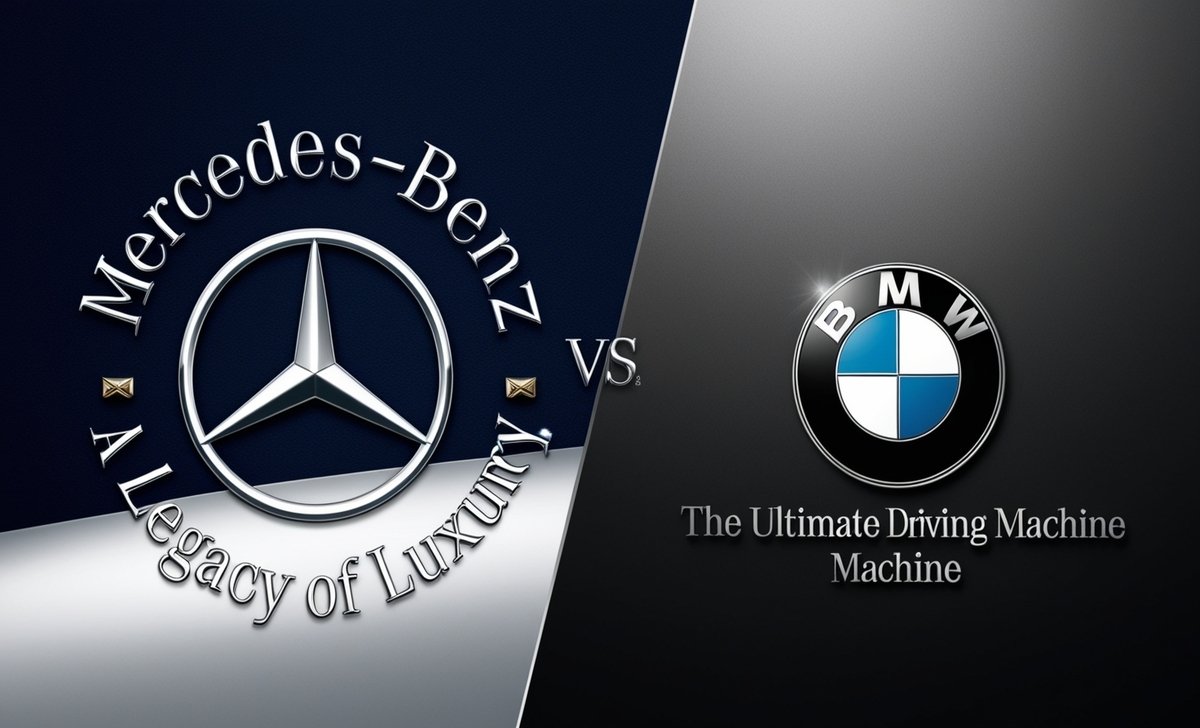
Mercedes-Benz: A Legacy of Luxury
Mercedes-Benz is renowned for its commitment to luxury and comfort. The brand emphasises elegant design and superior craftsmanship with models like the Mercedes-Benz E-Class and C-Class. These vehicles are often equipped with features such as larger alloys and plush interiors, making them ideal for those who prioritize a comfortable ride.
BMW: The Ultimate Driving Machine
Conversely, BMW markets itself as “The Ultimate Driving Machine.” Known for its sportier styling and powerful engines, BMW vehicles like the BMW 3 Series, X3, and X5 lead for driving enthusiasts. The emphasis on performance and handling makes these cars particularly appealing for those who love a spirited drive.
History And Brand Heritage
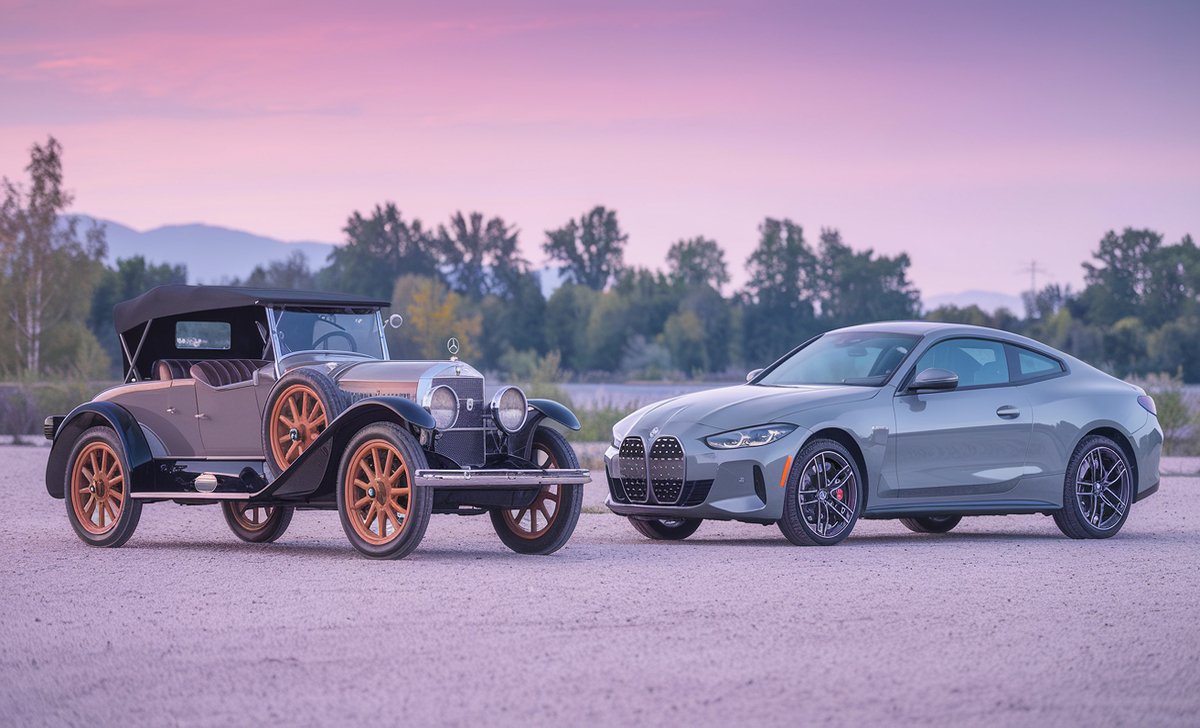
Mercedes-Benz
Founded in 1926, Mercedes-Benz has long been synonymous with luxury and innovation. The brand introduced many technological advancements in the automotive industry, such as the first gasoline-powered car and the first antilock braking system. Its commitment to safety and performance has set industry standards, making it a leader in the luxury segment.
BMW
Bayerische Motoren Werke, or BMW, was founded in 1916. It initially produced aircraft engines. Over the decades, BMW evolved into a manufacturer of high-performance luxury cars. Its “Ultimate Driving Machine” tagline focuses on driver engagement and performance, appealing to those who appreciate sporty handling and powerful engines.
Performance And Driving Experience
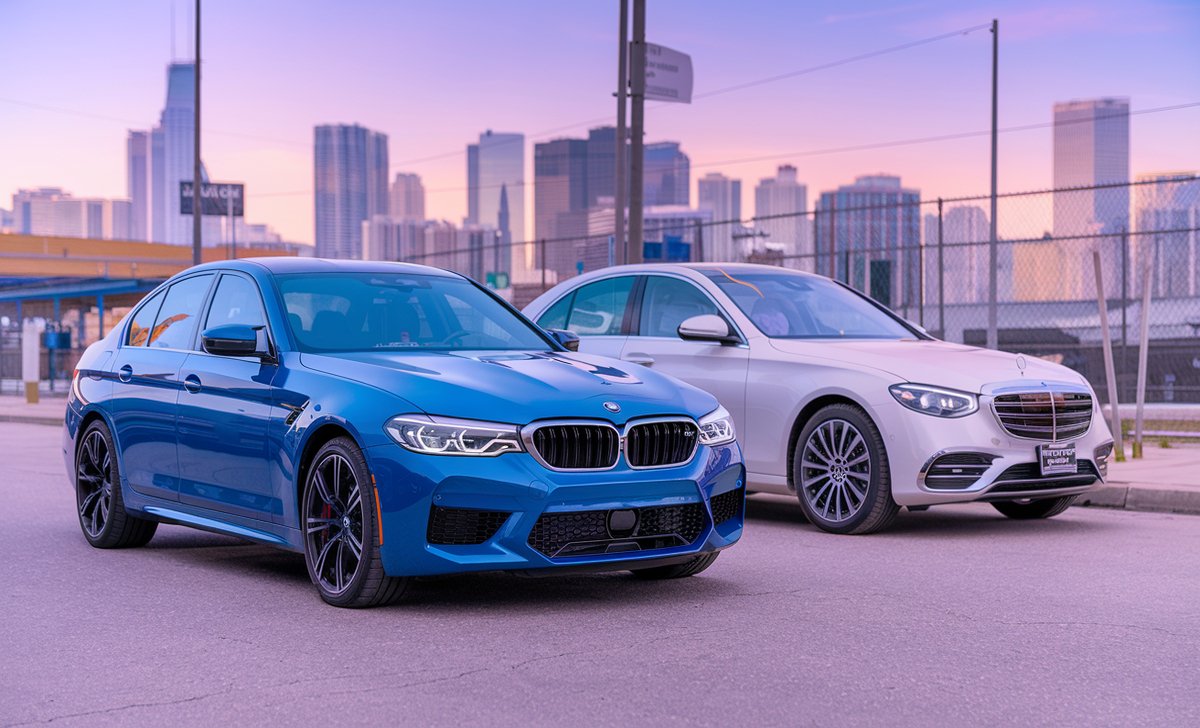
BMW Models
BMW cars, such as the BMW M5, are famous for their performance and handling. The brand’s focus on engineering creates an exhilarating driving experience. With features like a responsive steering system and performance-oriented design, BMW caters to those who enjoy driving as much as arriving.
Mercedes-Benz
While Mercedes-Benz vehicles offer great performance, the brand leans towards a smoother, more luxurious ride. Models like the Mercedes-Benz E-Class provide advanced technology and features that enhance comfort, making them ideal for long drives or daily commutes. The balance of luxury and performance makes Mercedes a strong contender in the luxury car market.
Technology And Features
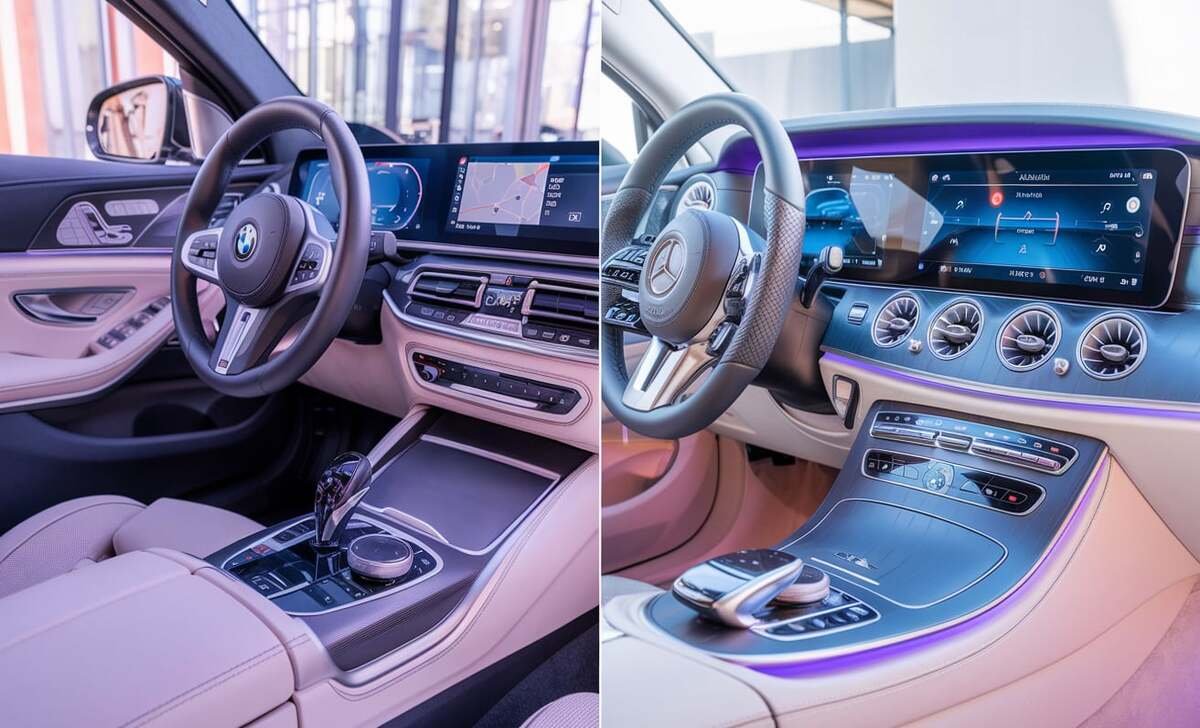
Both brands are equipped with cutting-edge technology, yet they differ in approach:
- BMW’s iDrive system is familiar for its intuitive controls, making it easy for car owners to access features quickly.
- Mercedes-Benz’s MBUX system often shines for its voice recognition capabilities and user-friendly interface.
Advanced Technology In Luxury Vehicles
Both brands prioritize safety, incorporating advanced features such as lane-keeping assist, adaptive cruise control, and automatic emergency braking. The choice may ultimately depend on personal preference regarding user interface and technology experience.
EV Trends And Market Preferences – Which Luxury Brand Reigns
When comparing BMW and Mercedes-Benz in the luxury car market, statistical insights reveal key differences that can help you determine which brand might better suit your needs:
Sales Performance:
- In 2023, BMW achieved 2.37 million global deliveries, surpassing Mercedes-Benz, which delivered 2.05 million vehicles. BMW retained its position as the top-selling luxury car brand globally.
- BMW’s electric vehicle (EV) segment saw significant growth in 2024, with over 294,000 EVs sold in the first nine months, a 19.1% year-over-year increase. Meanwhile, Mercedes-Benz EV sales in the same period dropped by 22% to 148,500 units.
Market Trends:
- BMW’s growth is attributed to its performance-oriented branding and a strong focus on EVs, such as the iX1 and i4 models, which have gained popularity in Europe and other regions.
- Mercedes-Benz, known for its luxury-first approach, has faced challenges in China, its largest market, due to increased competition from more affordable local EV brands.
Regional Popularity:
- In Europe, BMW has been outperforming Mercedes-Benz recently, particularly in the EV segment, capturing significant market share with a 35.8% year-over-year increase in EV sales.
- Mercedes-Benz still maintains a strong presence in North America, driven by its reputation for premium interiors and comfort-first vehicle design.
Maintenance And Reliability

Certified Offers And Value Service Of BMW
BMW Certified programs offer peace of mind for pre-owned specials, ensuring quality and reliability in used vehicles. BMW Financial Services provides various financing options, making it easier for potential owners to purchase their desired models. The BMW Value Service program helps keep maintenance costs in check, which is a significant consideration for many buyers.
Mercedes-Benz Reliability
Mercedes-Benz vehicles are also known for their reliability. Owners often report that the cars last for many years with proper maintenance, which is supported by a strong certified pre-owned program. While maintenance costs can be high, they are generally comparable to those of BMW.
Luxury And Personal Preference

The ultimate choice between Mercedes-Benz vs. BMW may boil down to personal preference. If you prioritize comfort, luxury, and a smooth driving experience, Mercedes-Benz is likely the better fit. For those who value a sportier driving experience and a connection to the road, BMW is the clear winner.
Car Comparison: Models To Consider
In a direct car comparison, consider the following models:
- BMW X2: Compact, sporty SUV with engaging handling.
- BMW X3: A versatile luxury SUV offering performance and space.
- Mercedes-Benz GLC 300: Luxury SUV that emphasizes comfort and technology.
Both brands offer a range of luxury sedans and sports cars that cater to different needs and preferences.
Pricing
- Mercedes-Benz vehicles generally come with a higher starting price, especially in the luxury SUV segment.
- BMW offers a slightly broader range, including more budget-friendly options in the compact luxury segment, though high-performance models can also be pricey.
Resale Value
Both brands retain their value well, but BMW has a slight edge in resale value, often attributed to its performance and driving experience, which tend to be highly regarded among enthusiasts.
Conclusion
In the end, choosing between Mercedes-Benz and BMW depends on what you value in a vehicle. Each brand offers exceptional features, performance, and reliability, making them leaders in the luxury car segment. Whether you opt for a BMW model or a Mercedes-Benz vehicle, you are sure to enjoy a high-quality driving experience.
FAQs
1.Which Brand Offers Better Reliability, Mercedes Or BMW?
Both brands are reliable, but Mercedes-Benz often has a slight edge in long-term reliability.
2.Are Bmws Cheaper To Maintain Than Mercedes?
Generally, maintenance costs are comparable, but some owners find Mercedes-Benz vehicles slightly less expensive to maintain.
3.What Is The Most Popular BMW Model?
The BMW 3 Series is one of the brand’s most popular models, known for its blend of performance and comfort.
4.Does Mercedes Offer Electric Cars?
Yes, Mercedes-Benz has introduced several electric models under its EQ line, showcasing its commitment to sustainability.
5.What Does “The Ultimate Driving Machine” Mean For BMW?
This slogan highlights BMW’s focus on delivering a sporty and performance-oriented driving experience.
6.Which Car Is The King Of Luxury?
Rolls-Royce is widely considered the “king of luxury” for its unmatched craftsmanship, bespoke features, and exclusivity.
7.Which Car Lasts Longer, Mercedes Or BMW?
Both Mercedes and BMW vehicles can last a long time with proper maintenance. However, Mercedes-Benz is often noted for slightly better long-term reliability and durability.
8.Which One Is Better, Mercedes, BMW, Or Audi?
- Mercedes-Benz excels in luxury and comfort.
- BMW is ideal for sporty driving and performance.
- Audi offers advanced technology and all-wheel-drive systems.
The choice depends on your preferences.
9.Which Is The No. 1 Richest Car?
Bugatti La Voiture Noire is currently the most expensive car globally, priced at approximately $19 million.
10.Who Sells More, BMW Or Mercedes?
BMW has consistently outsold Mercedes-Benz globally in recent years, securing the title of the world’s best-selling luxury car brand.